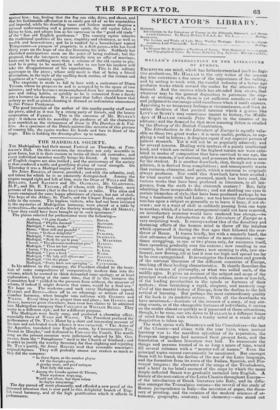THE MADRIGAL SOCIETY.
THE Madrigalians had their annual Festival on Thursday, at Free- mason's Hall. On this occasion, the members not only assemble in great force, but it is their custom to invite all their old comrades; and every individual member usually brings his friend. A large number of English singers are also invited ; and the anniversary of the society is thus rendered a noble and gratifying display of vocal strength. On Thursday it was a Madrigal engine of 100 horse-power. Sir JOHN ROGEIIS, of course, presided ; and with the urbanity, zeal, and talent for which he is so eminently distinguished. Among the singers ranged right and left of him, were the Dean of WELLS and Mr. BELLAMY, Lord SALTOUN and Mr. OLIPHANT, Mr. GLADSTONE, Ill. P., and Mr. E. TAYLOR; all of whom, with the President, were persons of the lowest (that is the bass) rank or table. The altos and tenors contained the same happy admixture of classes, but not of clefs. • The boys of the Abbey, St. Paul's, and the Chapel Royal, occupied a table in the centre. The hapless visiters, who had not been initiated in the mysteries of Madrigalian harmony, were placed at a table by themselves—the members of the Society wondering, like old "MORLEY, " how they could have been brought up in such ignorance." The pieces selected for performance were the following—
Anthem, " 0 give thanks " BoycE.
Madrigal, " Phyllis, farewell " BATESON. Madrigal, "Arise, awake " MORLEY. Motet, "How still and peaceful " ...... TYE.
Chorus, " In these delightful " PURCELL. Madrigal, " Stay one moment" OLIPHANT. Madrigal, " Basti fiu qui le pene" L. MA RENZI°. Chorus, " Thy pleasures moderation give " 1inxnEl.. Madrigal, " Thou art but young" BY E. Chorus, Tu es sacerdos " L. Leo.
Madrigal, " Upon a back " WARD. Madrigal, "My lady still abhors me" FE R ETTI.
Madrigal, " On the plains " Ei.x
Madrigal, "Every bush new springing " CAVENDISH. In his address to the company, the President alluded to the inser- tion of some compositions of comparatively modern date into the scheme, which he seemed to think demanded some apology, or at least explanation; hinting at the same time, that if in this instance the Committee bad " yielded to the pressure from without, the measure of reform, if indeed it might deserve that name, would be a final one." We hope so. The moderns—and such every Madrigalian regards HANDEL and BOYCE—show off to no advantage us writers of vocal chamber harmony, when brought into collision with GUIDONS and Wit.eve. Every thing in its proper time and place ; but HANDEL and BOYCE, however great elsewhere, have even less claims to be admitted into Madrigalian company than CALLCOTT or ‘VILLIA3I BEALE. They wrote in a different style, and for a different purpose. The Madrigals were finely sung, and produced a charming effect, especially those of WARD and WILBYE. The President prefaced the performance of Dr. TYE'S Motet by a short and interesting account of the rare and celebrated work whence it was extracted, " The Actes of the Apostles, translated into English metre, by CHRISTOPHER TYE, Doctor in Musyke," and dedicated to EDWARD the Fourth. The words sung on the present occasion were judiciously adapted by Mr. OLI- PHANT, from the " Paraphrases " used in the Church of Scotland ; and in order to justify the worthy Secretary for thus slighting and rejecting Dr. TIE'S poetry, Sir JOHN ROGERS read that venerable musician's original rhymes. They will probably amuse our readers as much as they did the company.
" In those dates, as the number playne
Of the disciples grew, A grudge arose, and grief certayne That daily did renew.
" Among the Greeks against th' Ebrues, Their wydowes dispysing,
Would not allow, but them refuse
In daylye minystring."
The day passed off most pleasantly, and afforded a new proof of the increased attention that is now paid to this delightful branch of Eng. lish vocal harmony, and of the high gratification which it affords in performance.


























 Previous page
Previous page